What Cannabis Rescheduling Really Means for Payroll, Taxes, and HR — and What It Doesn’t
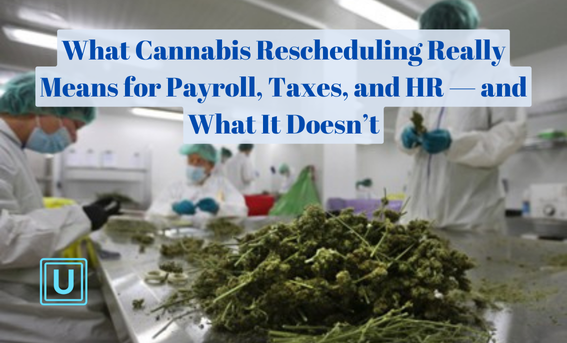
Recent headlines around cannabis rescheduling (often referred to in the media as ‘reclassification’) have sparked optimism across the industry. With President Donald Trump signing an executive order to fast-track cannabis from Schedule I to Schedule III, many business owners are asking the same question:
Does this finally make things easier for cannabis employers?
The short answer: not yet.
Here’s what actually changed—and what cannabis businesses still need to manage carefully across payroll, taxes, and HR.
Schedule III Explained
Cannabis moving to Schedule III means the federal government now recognizes potential medical value and a lower risk profile compared to Schedule I substances.
What this enables:
- Easier federal research
- Broader medical studies led by the Food and Drug Administration
- A shift in tone at the federal level
What it does not do:
- It does not legalize cannabis federally
- It does not override state laws
- It does not change employer obligations overnight
Think of this as a research and regulatory signal, not a business license.
What Did Change for Cannabis Businesses
There are meaningful signals worth noting:
- Federal acknowledgment that cannabis has medical applications
- Fewer barriers to medical research and CBD studies
- Long-term momentum toward standardized, pharmaceutical-style regulation
For the industry, this is a legitimacy milestone—but one that unfolds gradually, not instantly.
What Didn’t Change (Where Most Confusion Comes From)
Despite optimistic headlines, the fundamentals remain the same:
- Cannabis is still illegal at the federal level
- State employment, wage, and tax laws still govern operations
- IRS 280E still applies
- Banking, payroll processing, and compliance restrictions remain in place
If you’re running payroll or managing employees today, your obligations did not suddenly change.
Payroll Reality: Why Nothing Gets Simpler (Yet)
In fact, regulatory transitions often increase risk for employers.
Why:
- Federal signals and state enforcement don’t move at the same speed
- Multi-state operators still face different wage, overtime, and break rules
- Payroll accuracy becomes more critical during regulatory scrutiny
This is not the moment for shortcuts or manual workarounds.
Key takeaway: Regulatory uncertainty raises payroll risk—it doesn’t reduce it.
Tax Reality Check: When Schedule III Does — and Doesn’t — Change 280E
One of the biggest questions around cannabis rescheduling is how it affects taxes— specifically IRS Section 280E.
Here’s the precise reality.
Today:
Because cannabis is still federally classified as a Schedule I substance, IRC §280E remains in force. This means cannabis businesses are currently barred from deducting ordinary and necessary business expenses (such as rent, wages, marketing, and office costs) and are generally limited to cost of goods sold (COGS).
What Changes Once Schedule III Is Officially Effective:
Most authoritative tax analyses agree that Section 280E applies only to Schedule I and Schedule II substances. Once cannabis is formally rescheduled to Schedule III—and the DEA’s final rule is published and takes legal effect—280E would no longer apply to cannabis businesses going forward. At that point, operators would be able to deduct ordinary business expenses like other U.S. companies under IRC §162.
Why Caution Still Matters Right Now:
- The executive order directs expedited rescheduling, but the process is not yet complete
- The DEA must still publish the final rule in the Federal Register
- Until that rule is effective, 280E continues to govern federally
- Most commentary expects the change to apply prospectively, not retroactively, unless IRS guidance states otherwise
Bottom line:
Schedule III has the potential to remove the long-standing 280E tax penalty—but only once rescheduling is legally finalized. Until then, cannabis businesses should continue operating under current tax rules and plan carefully for the transition period.
HR & Employment Compliance: The Quiet Risk Area
Payroll gets attention—but HR compliance is where many cannabis businesses are exposed.
Areas to watch closely:
- Proper worker classification (W-2 vs contractor)
- I-9 and E-Verify documentation
- Drug-free workplace and accommodation policies
- PTO, leave laws, and termination compliance
These issues don’t show up immediately—but they compound over time.
Why Federal Signals Increase Employer Responsibility
As cannabis moves closer to mainstream regulation, expectations rise:
- Cleaner records
- More standardized audits
- Less tolerance for informal processes
Industries like alcohol and pharmaceuticals followed this same path: legitimacy brought scrutiny, not leniency.
How Cannabis SMBs Should Prepare (Without Overreacting)
You don’t need to predict the future—but you do need to be ready for it.
Practical steps:
- Keep payroll and HR systems audit-ready
- Centralize employee records and time tracking
- Document policies clearly
- Avoid assumptions based on headlines
Preparation beats speculation.
Final Word: Stability Beats Speculation
Cannabis rescheduling is an important step—but it’s not a shortcut.
For employers, the smartest move is to:
- Ignore political noise
- Focus on compliance fundamentals
- Build systems that hold up even when regulations evolve
The businesses that win long-term won’t be the ones chasing headlines—they’ll be the ones running clean, compliant, and resilient operations.
Recommended Reading: Biggest pain point with Payroll and HR software
Get in touch with us for an expert-led demo to know more about UZIO all-in-one payroll software.
UZIO 2025 Year in Review: A Transformational Year of AI, DSP Expansion & Customer Trust
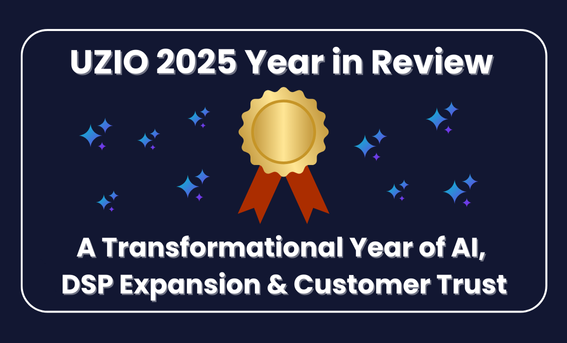
2025 will be remembered as the year UZIO expanded its vision, strengthened its foundation, and accelerated into a new era of AI-powered workforce management.
From deepening our AI capabilities to signing one of the biggest partnerships in our company’s history, to earning customer-driven awards—this year reshaped what UZIO stands for and what our customers can expect in the years ahead.
Below is a look back at the milestones that defined 2025—and how they translate into value for your business.
1. A Landmark Milestone: UZIO Signs National DSP Agreement
This September, UZIO entered a major partnership to power workforce management for thousands of Delivery Service Providers (DSPs) across the country—representing over 200,000 drivers handling last-mile logistics for one of the world’s largest networks.
This wasn’t just another deal.
It was a validation of our long-term AI-first vision and the work of every team across UZIO. Over six months, our product, engineering, and tech ops teams delivered functionality that would typically take a year—proving what UZIO can accomplish with a clear mission and relentless collaboration.
What this milestone means for DSPs & SMBs
- Faster, more accurate payroll
- Stronger wage-and-hour compliance
- Advanced time tracking designed for large hourly teams
- AI agents that preemptively flag compliance risks
- A platform capable of scaling from local operations to nationwide fleets
This investment benefits all UZIO customers—especially those managing complex hourly workforces.
2. AI at the Core: The Rise of UZIO.ai & Digital Workers
2025 marked the first full year of UZIO.ai—our AI-powered platform designed to automate the work behind HR, payroll, and compliance, not just organize it.
AI Innovation Highlights
- AI Expense Management launched in January
- Digital Workers for payroll anomaly detection, benefits administration, and tip calculations
- Compliance Monitoring Agents to track potential wage and hour violations
- Embedded AI Copilot Widget with persistent chat and contextual guidance
These capabilities helped clients save hours every week—reducing errors, streamlining workflows, and empowering smaller teams to operate like much larger ones.
3. A Year of Product Momentum: Month-by-Month Progress
Throughout the year, UZIO shipped enhancements focused on real-world accuracy, automation, and compliance—especially for hourly workforces and multi-location operations.
Jan–March: Strong Foundations
- Launched AI Expense Management
- Introduced mobile and scheduling improvements
- Implemented CAPTCHA, enhanced security, and employee profile change confirmations
- Launched Pay Groups and pay-method overrides
- Announced upcoming mandatory two-factor authentication
Apr–June: UZIO.ai Launch & Compliance Automation
- Official launch of UZIO.ai
- AI-powered digital workers begin handling repetitive HR tasks
- Released parallel payroll runs, improved holiday hour logic, and post-termination self-service
- Added new Time & Attendance controls and report enhancements
Jul–Sept: DSP-Driven Innovation
- Timecard approvals, audit trails, and scheduling improvements
- AI agents used to reduce wage-and-hour risk
- National DSP partnership signed
- Deep investments into compliance automation for large hourly teams
Oct–Nov: Logistics-Grade Enhancements
- Missed/short break premium logic
- Auto-break guardrails
- Facial recognition on kiosk + mobile biometrics
- Polygon geofencing for precise job sites
- Offline time tracking
- Unlimited PTO policies, PTO payout automation, and prevention of retro accruals
- Enhanced year-end workflows and mobile performance
This year’s releases solidified UZIO as one of the most compliant, accurate, and operationally efficient platforms for SMBs and DSPs.
4. Customer-Driven Recognition: A Year of Awards
2025–26 brought significant recognition from the market—fueled entirely by customer reviews.
UZIO earned:
- 2026 Buyer’s Choice Award (TrustRadius)
- 2025 Tech Cares Award (TrustRadius)
- G2 “Users Love Us” Badge — 4.4/5 rating from 80+ reviews
These awards reflect our commitment to capabilities, value, and exceptional customer relationships—something we’re deeply proud of.
5. CEO’s Perspective: A Year of Acceleration
Throughout 2025, CEO Sanjay Singh used the monthly CEO Corner to share insights, challenges, and direction. A few themes stood out:
1. AI as a Practical Advantage
“AI at UZIO is not hype—it’s real work being done by digital workers so your HR and payroll teams don’t have to.”
2. Helping Businesses Do More With Less
“In a shifting economic environment, our goal is to help you operate leaner while staying compliant and accurate.”
3. Supporting Hourly Workforces at Scale
“From break compliance to scheduling to geofencing, we’re building for the businesses that run America’s frontline workforce.”
4. Year-End Confidence
“Our December enhancements aim to make year-end processing smoother, faster, and stress-free for your teams.”
This leadership narrative shaped the company’s focus all year—and continues to guide our vision for 2026.
6. What This Big Year Means for You
Whether you’re an SMB, a DSP, a cannabis company, or a growing mid-market organization:
UZIO helps you:
- Reduce manual HR & payroll work
- Improve compliance with AI-powered oversight
- Manage hourly, distributed workforces with ease
- Deliver better experiences through mobile, kiosk, and geofencing tools
- Run payroll accurately—even at scale
2025 wasn’t just a year of new features—it was a year of transformation.
7. Looking Ahead to 2026
Next year, expect:
- New AI agents that automate full workflows
- Even deeper investments in mobile and analytics
- Expanded capabilities for DSPs, logistics, healthcare, and cannabis
- Enhanced compliance engines powered by machine intelligence
- More tools that let you run your business—not paperwork
Thank you for trusting us throughout this landmark year.
Here’s to an even more impactful 2026.
Recommended Reading: Biggest pain point with Payroll and HR software
Get in touch with us for an expert-led demo to know more about UZIO all-in-one payroll software.
UZIO’s December 2025 Product Release – Exciting New Features Now Live!
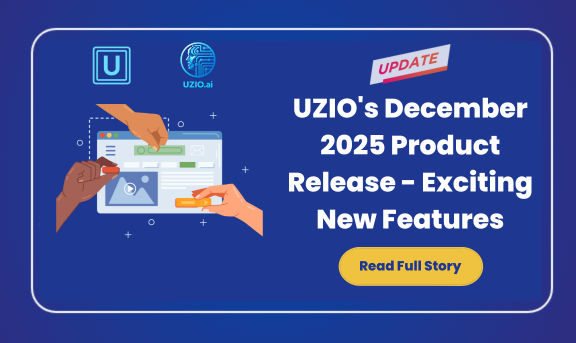
Great Falls, VA.
As we move closer to the end of the year, we are pleased to announce that the December Product Release is now live on UZIO platform. This release introduces some great enhancements across Payroll, Time Tracking, Mobile App, Hiring and Onboarding, and Login and Registration workflows. Each improvement strengthens accuracy, simplifies operations, and expands employee self service.
What’s New in December
UZIO Time Tracking Enhancements
- Custom Workday Start Time for Overtime Calculations – Overtime now follows a custom 24 hour workday window aligned to your operational schedule rather than the standard midnight to midnight cycle.
- Break Handling Enhancement – Breaks that span across two intervals are now treated only as breaks of the interval where they started, ensuring correct missed break detection and premium calculation when applicable.
UZIO Mobile App Enhancements
- Documents on Mobile – Employees can review, sign, acknowledge, and download assigned documents from their mobile device.
- Tasks on Mobile – Employees can complete tasks and upload supporting files directly from their mobile device.
- Federal Tax Withholding (W4) on Mobile – Employees can view and update W4 information from their mobile device.
- Payment Method on Mobile – Employees can set up direct deposit, manage paycheck allocation, or select check payments from their mobile device.
UZIO Hire and Onboarding Enhancements
- Mobile Responsive Login and Registration Pages for Employees – Improved layout, readability, accessibility on the mobile device, for the login and registration pages.
- Mobile Responsive Offer Letter Workflow – Candidates can easily review and sign offer letters from their phone in a smooth and responsive layout.
- Mobile Responsive Self Onboarding Workflow – A redesigned onboarding experience optimized for mobile screens with step by step navigation.
UZIO Payroll Enhancements
- Non Discretionary Bonus Setup and Processing – Automated overtime calculation support for bonuses across multiple retro periods and for the current period
- State Specific Withholding (W4) Form Support – Official state form generation and complete data capture for compliant documentation.
- Mid Pay Period Rate Change Handling – Automatic pay rate splitting based on effective dates with accurate visibility in payroll reports and paystubs.
For more details about any of these features, please click here. For any other query, please email info@uzio.com or give us a call at (866) 404-0284.
A word from the CEO:
“Right from the beginning, we have instituted a company culture where our team members make an extra effort to listen to the feedback from our customers and are always on the lookout for ways to improve the end user experience.” said Sanjay Singh, CEO of UZIO Technology, Inc. “A number of enhancements in this release are the direct result of a collaborative working relationship we have with our customers where their feedback is listened to and given high priority as we make investment in our product roadmap.“
About UZIO Technology Inc.:
With over 150+ broker partners, 1700+ Employers relying on UZIO and 70+ carriers serving plans, UZIO offers an Integrated HR, Benefits Administration, and Payroll technology platform for brokers, employers, and employees in the SMB space. UZIO enables SMBs to manage HR and compliance with its user-friendly platform and advanced features.
UZIO Wins Two Major Industry Awards in 2025–26: A Year Powered by Customer Trust and Impact

As we approach the end of 2025, we’re proud to share a milestone moment for UZIO. This year, our customers, community, and the industry recognized the real impact of our AI-powered Payroll & HR platform with two major TrustRadius awards — the 2025 Tech Cares Award and the 2026 Buyer’s Choice Award.
These recognitions matter to us because they are rooted in authentic customer feedback. They reflect the trust SMBs, Amazon DSPs, and mid-market teams place in UZIO every single day to help run their business efficiently.
1. UZIO Wins the 2026 Buyer’s Choice Award (TrustRadius)
The Buyer’s Choice Award is one of the most customer-driven recognitions in the B2B software world.
- 75%+ of reviewers rating the product best in:
✔ Capabilities
✔ Value for price
✔ Customer relationships
UZIO met — and surpassed — these standards, placing us alongside the industry’s biggest names like ADP, Paycom, UKG, Rippling, Paylocity, BambooHR, and others.
This award reinforces that UZIO is delivering what matters most to SMBs:
- A powerful, AI-first Payroll & HR platform
- Thoughtful onboarding and customer relationships
- Transparent pricing built for growing teams
- Dependable support while scaling new operations
2. UZIO Receives the 2025 Tech Cares Award (TrustRadius)
This award celebrates companies making a positive impact beyond technology — through culture, community involvement, sustainability, inclusion, and employee well-being.
UZIO was recognized for our ongoing commitment to:
- Supporting employees and families
- Promoting diversity and inclusion
- Giving back to communities
- Building a culture that prioritizes people, not just productivity
Being named among purpose-driven companies like Adobe, Microsoft, IBM, Avalara, Paychex, Paycom, UKG, Zendesk, Zoho, Zoom and many others is a moment of pride for our entire team.
3. G2 “Users Love Us” Badge — Continued Recognition
Alongside these new awards, UZIO continued to hold the G2 Users Love Us badge — a testament to consistent customer satisfaction.
UZIO’s current score: 4.4/5 (based on 89 reviews).
This reflects strong satisfaction with our payroll accuracy, AI-powered insights, HR workflows, customer support, and affordability.
What These Awards Mean for Our Customers
UZIO is built to deliver enterprise-grade Payroll & HR technology at SMB-friendly pricing — without compromising support, speed, or compliance.
With AI at the core of our platform, we continue to focus on:
- Reducing administrative work
- Improving payroll accuracy
- Ensuring compliance
- Saving time for owners, managers, and HR teams
- Delivering a unified HR, Payroll, Time, and Benefits experience
A Thank You to Our Customers & Our Team
To our customers:
Thank you for the trust, honest feedback, and partnership. These awards are because of you.
To the UZIO team:
Your dedication, passion, and commitment to simplifying work for SMBs and DSPs is what drives our success.
What’s Ahead
2026 will be a transformative year as we expand into new industries, strengthen our AI capabilities, and scale our mid-market and logistics/DSP verticals.
And with your continued trust, we’re just getting started.
Recommended Reading: Biggest pain point with Payroll and HR software
Get in touch with us for an expert-led demo to know more about UZIO all-in-one payroll software.
UZIO’s November 2025 Product Release – Exciting New Features Now Live!
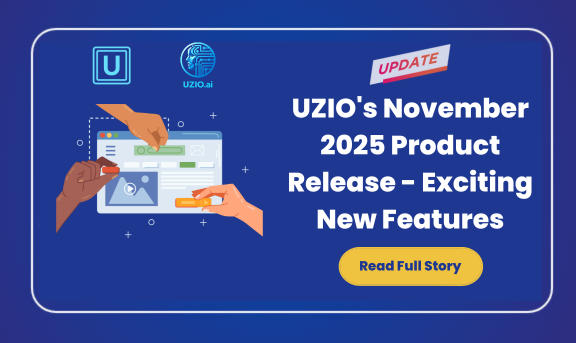
Great Falls, VA.
We are pleased to share that a new set of mid November enhancements is now live on our platform. These updates build on the momentum from the October release and bring meaningful improvements to break compliance, time entry workflows, and time off management.
What’s New in November
UZIO Time Tracking Enhancements
- Break Guardrails: A new guardrails section gives employers more control over how breaks are taken and recorded. You can now prevent early break endings, auto end breaks, and flag both short and long breaks to maintain consistency.
- Break Premiums for Short and Missed Breaks with Premium Capping: Premiums now apply to short breaks along with missed breaks. A daily premium cap of one hour per category maintains compliance and transparency.
- Enhancement to Add or Edit Time Entry and Missed Break Flow: Manual time entries now recalculate premiums with greater accuracy. The experience is smoother and the timesheet view is cleaner since premiums appear at the entry level.
UZIO Time Off Enhancements
- Unlimited Accrual Method in Time Off Policies: You can now create an unlimited time off policy without the need for workarounds. Under this new accrual method, employees continue requesting time off as usual while balances remain zero.
For more details about any of these features, please click here. For any other query, please email info@uzio.com or give us a call at (866) 404-0284.
A word from the CEO:
“Right from the beginning, we have instituted a company culture where our team members make an extra effort to listen to the feedback from our customers and are always on the lookout for ways to improve the end user experience.” said Sanjay Singh, CEO of UZIO Technology, Inc. “A number of enhancements in this release are the direct result of a collaborative working relationship we have with our customers where their feedback is listened to and given high priority as we make investment in our product roadmap.“
About UZIO Technology Inc.:
With over 150+ broker partners, 1700+ Employers relying on UZIO and 70+ carriers serving plans, UZIO offers an Integrated HR, Benefits Administration, and Payroll technology platform for brokers, employers, and employees in the SMB space. UZIO enables SMBs to manage HR and compliance with its user-friendly platform and advanced features.
UZIO’s October 2025 Product Release – Exciting New Features Now Live!

Great Falls, VA.
We’re excited to share that the October Product Release is now live on your UZIO platform. This release introduces a wide range of new features and improvements across Time Tracking, Time Off, Payroll, Mobile app and Employee profile modules— each designed to simplify operations, strengthen compliance, and enhance the user experience.
These latest updates are a direct result of feedback from our customers and partners, continuing our mission to eliminate friction and manual work from everyday HR operations.
What’s New in October
UZIO Time Tracking Enhancements
- Missed Break Calculation and Premium Logic – The system now identifies breaks missed within their eligible windows, ensuring accurate premium pay and compliance.
- Break Notifications and Restrictions – Automated reminders notify employees when it’s time to start or end breaks, while new settings let you restrict early break starts.
- Shift Scheduling Notifications – Send real-time notifications to employees and managers.
- Time Attestation – Employees can now review and confirm their time entries at clock-out or from their timesheet for improved accuracy and accountability.
- Long Running Time Entry – Employers now have configurable reminder settings.
- Missed Clock-Out Punch – Allow Employees to Clock In for the Next Shift if they missed the clock out from the previous shift.
UZIO Kiosk and Mobile App Enhancements
- Biometric Login (Facial Recognition on Kiosk): Employers can now enable employees to log in to the Kiosk using facial recognition, offering a faster and secure alternative to PIN-based authentication.
- Biometric Authentication (Fingerprint/Face/Pin on Mobile App): Unlock the Mobile app using the device’s native biometric options such as fingerprint or face ID for quick, secure access.
- Offline Time Tracking: Track time even without internet connectivity, entries automatically sync once the connection is restored.
- Push Notifications: Receive instant alerts for new documents, tasks, and approvals directly on mobile.
- Profile Self-Service: Employees can view and update personal details such as contact information and address from the mobile app.
- Polygon Geofencing: Define precise, multi-point worksites to prevent off-site punches and improve location accuracy.
UZIO Time Off Enhancements
- Automatic Reversal of PTO Accruals on Void Payroll: Reverses PTO accruals linked to voided payrolls to maintain perfect synchronization.
- Automatic PTO Balance Payout on Employee Termination: Automatically calculates and syncs PTO balance payouts during termination, ensuring accurate and timely processing.
- Adjusted Service Date: Enables accurate accruals for rehires or employees whose prior service should be recognized.
- Automatic Proration for Rehired Employees: Applies correct proration rules automatically upon rehire.
- Prevention of Retroactive Accruals: Stops PTO from back-calculating for employees added late to a policy.
UZIO Payroll Enhancements
- Enhanced Employee Tax Withholding Setup: How employees view or update their state tax withholding pages and provide consent when making changes.
- Voluntary Life Deduction Enhancements: Process voluntary life insurance deductions separately for employee, spouse, and child coverage.
- Holiday Premium Pay Flexibility: Choose whether overtime and double-time hours worked on holidays also receive premium pay.
UZIO General Enhancements
- Employee Profile Enhancements: Simplified field names, effective-dated tracking for key classifications, support for multi-select custom fields, license-tracking options, and bulk reporting-manager uploads.
- New Biometric Policy, Privacy Policy and Terms of Use Updated: With the introduction of biometric features on the kiosk, our Privacy Policy and Terms of Use have been updated, along with the addition of a new Biometric Policy. We encourage you to review the updated documents for complete details. Please look out for a separate email that will explain these updates in more detail.
For more details about any of these features, please click here. For any other query, please email info@uzio.com or give us a call at (866) 404-0284.
A word from the CEO:
“Right from the beginning, we have instituted a company culture where our team members make an extra effort to listen to the feedback from our customers and are always on the lookout for ways to improve the end user experience.” said Sanjay Singh, CEO of UZIO Technology, Inc. “A number of enhancements in this release are the direct result of a collaborative working relationship we have with our customers where their feedback is listened to and given high priority as we make investment in our product roadmap.“
About UZIO Technology Inc.:
With over 150+ broker partners, 1700+ Employers relying on UZIO and 70+ carriers serving plans, UZIO offers an Integrated HR, Benefits Administration, and Payroll technology platform for brokers, employers, and employees in the SMB space. UZIO enables SMBs to manage HR and compliance with its user-friendly platform and advanced features.
UZIO’s August Product Release – Exciting New Features Now Live!
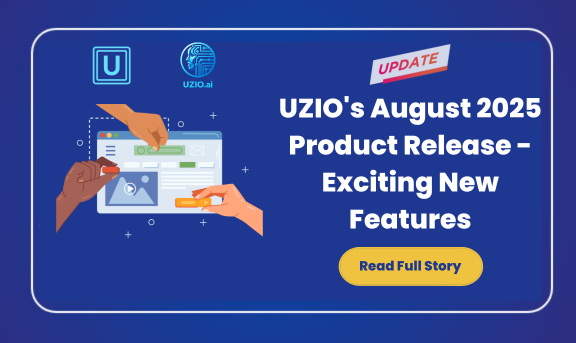
Great Falls, VA.
We’re excited to share our latest product enhancements across the UZIO and UZIO.ai platforms—focused on bringing greater flexibility, control, and ease-of-use to your Payroll and Time Management workflows.
These latest updates are a direct result of feedback from our customers and partners, continuing our mission to eliminate friction and manual work from everyday HR operations.
What’s New in August
Timecard Management Enhancements
- Manager Approval for Employee Timecard Changes – Add an extra layer of verification to manual timecard edits by employees, ensuring wage payments are based on approved and accurate hours.
- Time Entry Audit Trail – Maintain a complete history of all time entry changes for transparency and easy retrieval during audits or dispute resolution.
- Multiple Notes for a Timecard – Add and manage multiple notes within a single timecard to capture full context and details.
AI Copilot
- Integrated Copilot Widget – Available on every page for easy access without leaving your task.
- Chat History – Revisit and continue past Copilot conversations, just like today’s most advanced AI assistants.
New API Endpoints
Two new endpoints have been added to the list of available APIs: Get All Time Entries and Get Payroll Information by Date Range.
For more details about any of these features, please click here. For any other query, please email info@uzio.com or give us a call at (866) 404-0284.
A word from the CEO:
“Right from the beginning, we have instituted a company culture where our team members make an extra effort to listen to the feedback from our customers and are always on the lookout for ways to improve the end user experience.” said Sanjay Singh, CEO of UZIO Technology, Inc. “A number of enhancements in this release are the direct result of a collaborative working relationship we have with our customers where their feedback is listened to and given high priority as we make investment in our product roadmap.“
About UZIO Technology Inc.:
With over 150+ broker partners, 1700+ Employers relying on UZIO and 70+ carriers serving plans, UZIO offers an Integrated HR, Benefits Administration, and Payroll technology platform for brokers, employers, and employees in the SMB space. UZIO enables SMBs to manage HR and compliance with its user-friendly platform and advanced features.
UZIO June 2025 Product Update – Additional Enhancements Now Live!
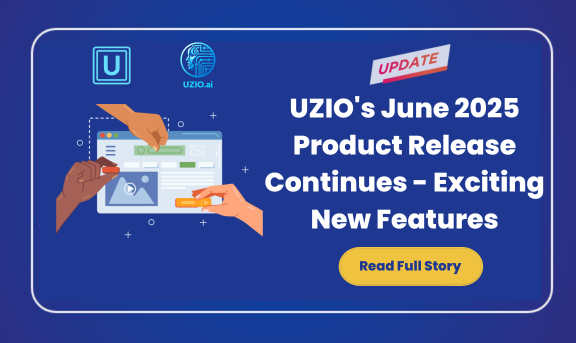
Great Falls, VA.
We’re excited to share the latest updates to the UZIO platform, designed in response to customer feedback. These enhancements aim to streamline our customers’ administrative processes.
Key Highlights
Platform Access for Terminated Employees
Terminated employees can now securely access the UZIO web platform with limited permissions to view and download essential documents like pay stubs, W-2s, and personal information details following the end of their employment.
Enhancements in Benefits Contribution Strategies
We’ve expanded the flexibility of our Reference Plan configuration, now supporting class-level reference plans and offering more control over how employer and employee contributions are structured. This gives our customers greater precision and alignment with their organization’s benefits strategy. Additionally, the employee contribution strategy has been updated to allow setting the employee’s share as a percentage, whereas the system previously only supported flat dollar amounts.
For more details about any of these features, please click here. For any other query, please email info@uzio.com or give us a call at (866) 404-0284.
A word from the CEO:
“Right from the beginning, we have instituted a company culture where our team members make an extra effort to listen to the feedback from our customers and are always on the lookout for ways to improve the end user experience.” said Sanjay Singh, CEO of UZIO Technology, Inc. “A number of enhancements in this release are the direct result of a collaborative working relationship we have with our customers where their feedback is listened to and given high priority as we make investment in our product roadmap.“
About UZIO Technology Inc.:
With over 150+ broker partners, 1700+ Employers relying on UZIO and 70+ carriers serving plans, UZIO offers an Integrated HR, Benefits Administration, and Payroll technology platform for brokers, employers, and employees in the SMB space. UZIO enables SMBs to manage HR and compliance with its user-friendly platform and advanced features.
Why HR Compliance in Cannabis is Complicated—and Risky
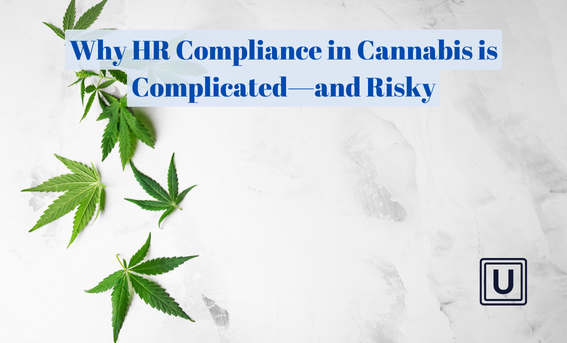
Operating a cannabis business in the U.S. isn’t just about licensing, inventory, and tax compliance—it’s about managing your people the right way, every day. And in 2025, the HR landscape is more complex than ever.
The cannabis industry exists in a unique legal gray zone. While many states have legalized cannabis for medical or recreational use, it remains a Schedule I substance at the federal level. That means cannabis businesses must operate like any mainstream employer—while navigating extra layers of scrutiny and risk.
At the same time, new state-level HR laws are constantly being enacted—from expanded paid family leave and minimum wage increases to regulations around pregnancy accommodations, cannabis use and disability, and workplace safety protocols.
The risk of non-compliance?
- Costly lawsuits
- OSHA fines
- Employee complaints or whistleblowing
- Lost licenses or banking privileges
- Poor employee retention and reputational damage
In short: you don’t get a compliance pass just because you’re in cannabis. You get held to a higher standard—and often with fewer resources.
1. The 2025 HR Compliance Checklist: Federal & State Laws to Track
Below is a concise, action-oriented rundown of the rules most likely to trip up cannabis SMBs this year. For each item you’ll see:
- Why it matters for cannabis operators
- Key 2025 changes (federal or state)
- Action steps you can take today—plus how UZIO streamlines each one
Pro-tip: Regulations differ by state. Where you operate in multiple jurisdictions (California today, New York tomorrow), document which locations fall under each rule and keep everything in a single source of truth—your HRIS.
| # | 2025 Hot-Button Law / Rule | Why Cannabis SMBs Should Care | 2025 Snapshot | Immediate Action Steps | How UZIO Helps |
|---|---|---|---|---|---|
| 1 | Crown Act (Anti-hair discrimination) | Retail budtenders and trimmers often wear natural hairstyles; bias claims hurt brand & morale. | Now law in >25 states (incl. CA, NY, WA). More on the ballot for 2025. | • Update grooming & dress-code language. • Add anti-bias training for managers. • Record policy acknowledgments. |
Upload revised policy in UZIO HRIS → push e-acknowledgment to all employees; track completions in dashboard. |
| 2 | Pregnant Workers Fairness Act (PWFA) | Cultivation & processing roles may involve standing, lifting, chemicals—accommodations are mandatory. | Federal law in force; EEOC enforcement ramping up in Q3-2025. | • Design a “reasonable accommodation” request form. • Train supervisors on interactive dialogue. • Document every accommodation provided. |
Use UZIO Forms & Workflows to capture requests, route to HR, and archive decisions for audit defense. |
| 3 | Paid Family & Medical Leave (PFML) | Manufacturing sites with small crews can’t afford surprise absences without a plan. | New PFML programs kicking in for MO, NE, AK; CA tweaks contribution rates mid-year. | • Map which employees are covered. • Update leave balances in payroll. • Communicate wage-replacement rules. |
UZIO Leave Tracker Checks for eligibility, auto-calculates accruals and syncs with payroll so checks remain accurate. |
| 4 | State Minimum-Wage Hikes | Cannabis payroll margins are tight; errors = back-pay + penalties. | 23 states raise rates on Jan 1; some (e.g., FL, OR) add mid-year bumps. | • Post updated wage posters. • Audit pay grades for compression. • Adjust piece-rate or trimmer-by-pound formulas. |
UZIO Payroll pulls real-time wage tables by work location and flags any pay rates below the new floor. |
| 5 | ADA vs. Off-Duty Cannabis Use | Employees may hold medical cards; state protections vary widely. | No federal protection yet, but CA, NY, NJ, CT, NV shield off-duty use—TX & GA do not. | • Separate impairment tests from drug tests. • Spell out “safety-sensitive” roles. • Consult counsel before adverse action. |
Store state-specific drug-testing policies in UZIO; HR can tag roles as “safety-sensitive” for easy reference. |
| 6 | OSHA & Workplace Safety (Cannabis Dust, PPE) | Processing keef/dust can trigger asthma; OSHA fines in 2024 exceeded $500k. | OSHA targeting airborne dust in 2025 blitz states (CA, CO, MA). | • Conduct air-quality assessment. • Mandate N95 or equivalent PPE. • Log training & fit-test records. |
Upload safety SOPs into UZIO LMS; auto-assign annual refresher courses and store completion certificates. |
2. Misclassification & Temporary Labor: The Hidden Compliance Trap
One of the most overlooked risks in cannabis HR compliance isn’t flashy legislation—it’s the everyday decisions around how you classify your workforce. For cannabis SMBs using seasonal workers, trimmers, or budtenders on flexible schedules, this can be a legal minefield.
The Risk
Improperly classifying employees as:
- 1099 contractors instead of W-2 employees
- Piece-rate workers without guaranteed minimum wage
- Temp workers without confirming proper vetting and licensing
…can trigger lawsuits, tax penalties, or disqualification from licensing renewals.
Arabella (a licensed farm labor contractor in California) shared how even well-meaning operators get burned by hiring through unlicensed temp agencies or failing to confirm that workers have proper training, I-9s, and harassment compliance.
Real-World Missteps Cannabis SMBs Must Avoid
| Misstep | What Happens | UZIO Response |
|---|---|---|
| Paying by the pound (e.g., trimmers) | Violates federal Fair Labor Standards Act (FLSA) if effective hourly pay falls below minimum wage | Use UZIO Payroll to configure hourly + performance-based bonus legally |
| Using “1099” gig labor for core operations | Workers file for unemployment or back pay → you’re liable for misclassification | Onboard all hires via UZIO HRIS, which flags risky classifications |
| Working with unlicensed staffing vendors | Labor compliance failures → penalties shift to you | Maintain signed vendor compliance attestations in UZIO’s Document Center |
| Skipping harassment or safety training for temp staff | You’re liable for ALL workers on your premises—even temps | Assign required LMS courses (e.g., sexual harassment, OSHA) to all workers, not just FTEs |
Pro-Tip for Operators:
“Temporary labor is not temporary liability. If they’re working under your roof—you’re responsible.”
3. Operate Like a Mainstream Business: Federal Agencies Aren’t Looking the Other Way
Many cannabis employers assume that because their business is federally illegal, they somehow fly under the radar of traditional regulatory bodies. That’s a dangerous misconception.
As the panelists emphasized in the webinar: OSHA, EEOC, the IRS, and even the Department of Labor treat you like any other employer—and in some cases, they scrutinize cannabis businesses more closely due to perceived risk.
Federal Oversight Is Real—and Rising
| Agency | What They Watch | Cannabis Impact |
|---|---|---|
| OSHA | Workplace safety (air, equipment, PPE, training) | Cited cannabis processors for dust inhalation fatalities (e.g., Trulieve case) |
| EEOC | Discrimination, sexual harassment, DEI policies | Filed lawsuits against cannabis operators in federal court |
| DOL | Wage & hour violations, misclassification | No leniency for “piece rate” pay or off-books labor |
| IRS | Payroll tax compliance, benefits plans | Cannabis workers still subject to standard tax law—even under 280E restrictions |
Common Cannabis-Specific Compliance Mistakes
- Failing to define safety-sensitive roles (critical when testing for cannabis use)
- Lacking documented SOPs or handbooks to show policies were communicated
- No escalation chain for reporting HR or safety violations
- Operating without valid venue/choice-of-law provisions in contracts, which can leave you vulnerable in hostile state or federal courts
Whether you’re in cannabis or coffee, you must operate with the same HR discipline as any Fortune 500 company—just with more landmines to avoid.
4. Multi-State Headaches, Future-Proof Solutions: Why UZIO Is Built for Cannabis SMBs
As the cannabis industry matures, multi-state operators (MSOs) and ambitious single-state businesses alike are facing a new reality:
What works in California might get you fined in Florida.
What you did last year may be non-compliant today.
Laws shift rapidly—whether it’s around off-duty cannabis use, minimum wage thresholds, mandated benefits, or training requirements. Without a system that scales across jurisdictions, compliance becomes guesswork.
Common Challenges for Growing Cannabis SMBs
| Challenge | Risk | UZIO Solution |
|---|---|---|
| Expanding into a new state without updated wage & leave policies | Back pay lawsuits, audit penalties | UZIO auto-updates labor law compliance by state, synced with payroll |
| Lack of centralized SOPs & version control | “I didn’t know” is not a defense | UZIO HRIS stores versioned policies, with digital acknowledgment tracking |
| Running disconnected systems (payroll, HR, compliance) | Errors, miscommunication, missed deadlines | UZIO is a unified platform built to simplify cannabis operations |
5. Final Takeaway: Cannabis HR Is High-Risk—But With UZIO, You’re Covered
Regulators don’t care if you’re a cannabis company or a coffee shop—you’re expected to hire, train, pay, and protect your team in full compliance with the law.
UZIO helps you get there faster.
From onboarding and handbook creation to training and payroll audits, our AI-first HR and compliance platform is built for cannabis businesses like yours.
Schedule a demo or Talk to our compliance team to see how UZIO can help your cannabis business stay audit-ready and future-proof in 2025.
Recommended Reading: Biggest pain point with Payroll and HR software
Get in touch with us for an expert-led demo to know more about UZIO all-in-one payroll software.
UZIO June 2025 Product Update – More Flexibility in Payroll & Time Management
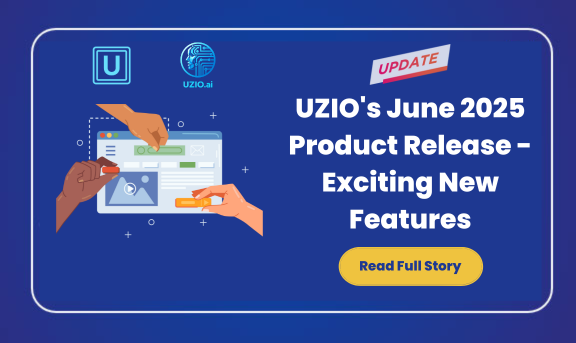
Great Falls, VA.
We’re excited to share our latest product enhancements across the UZIO and UZIO.ai platforms—focused on bringing greater flexibility, control, and ease-of-use to your Payroll and Time Management workflows.
These June updates are a direct result of feedback from our customers and partners, continuing our mission to eliminate friction and manual work from everyday HR operations.
What’s New in June
Parallel Payroll Runs
Previously, users were limited to processing either a regular or special payroll at one time. With this update, you can now run both payroll types simultaneously, even if one is in draft mode.
💡 This is especially helpful when issuing urgent payments for terminated employees, without waiting for the full payroll cycle to complete.
Timesheet Access Without Clock In/Out Permissions
You now have the ability to restrict employees from clocking in/out via the web or mobile app, while still allowing them to view their timesheets and schedules.
💡 This helps enforce kiosk-based time tracking while maintaining transparency and accessibility for employees.
Custom Time Display Format (12-hour or 24-hour)
Admins can now choose between 12-hour (AM/PM) and 24-hour (military) time formats at the company level. This setting reflects across:
-
Web
-
Mobile
-
Kiosk
-
All time tracking reports and schedule views
🛠️ This ensures consistent time visibility that matches your organization’s preferences.
For more details about any of these features, please click here. For any other query, please email info@uzio.com or give us a call at (866) 404-0284.
A word from the CEO:
“Right from the beginning, we have instituted a company culture where our team members make an extra effort to listen to the feedback from our customers and are always on the lookout for ways to improve the end user experience.” said Sanjay Singh, CEO of UZIO Technology, Inc. “A number of enhancements in this release are the direct result of a collaborative working relationship we have with our customers where their feedback is listened to and given high priority as we make investment in our product roadmap.“
About UZIO Technology Inc.:
With over 150+ broker partners, 1700+ Employers relying on UZIO and 70+ carriers serving plans, UZIO offers an Integrated HR, Benefits Administration, and Payroll technology platform for brokers, employers, and employees in the SMB space. UZIO enables SMBs to manage HR and compliance with its user-friendly platform and advanced features.